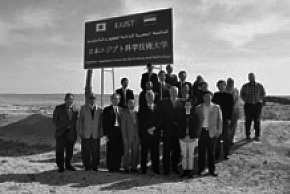Japan's Official Development Assistance White Paper 2009
Section 2 Measures for Each of the Priority Issues
The four priority issues of poverty reduction, sustainable growth, approaches to global issues, and peacebuilding are listed in the ODA Charter. This section will introduce Japan's recent approaches to these issues.
1. Poverty Reduction
(1) Education
Education plays an important role in socio-economic development for poverty reduction. It also enables individuals to develop their own talents and capabilities, as well as to live with dignity. However, approximately 72 million children are unable to attend school worldwide, 54% of which are girls. The total number of adults who do not possess the minimum literacy ability is roughly 759 million people, of which two-thirds are women (Note 7). The international community aims at realizing "Education for All (EFA)" to improve this situation (Note 8).
Notes:
(7) Source: UNESCO, EFA Global Monitoring Report 2010, 2010.
(8) EFA: Education for All. The World Conference on Education for All in 1990 in Jomtien, Thailand, confirmed that every child, youth, and adult must be provided with basic education (education for acquiring necessary knowledge and skills and education needed to fulfill basic learning needs) as Education for All (EFA).
<Japan's Efforts>
Emphasizing "nation building" and "human resource development," Japan provides developing countries with wide ranging educational supports, including basic education, higher education, and technical and vocational education and training. Japan announced the "Basic Education for Growth Initiative (BEGIN)" in 2002, based on which it provides assistance that combines both "hard" and "soft" aspects, such as building schools and teacher training, with the emphasis on ensuring opportunities for education, raising its quality, and improving management as priorities. There is also the "Fast Track Initiative (FTI)" (Note 9), a global framework to achieve universal primary education by 2015. As the G8 chair, Japan served as an FTI co-chair and member of its Steering Committee from January 2008, and was deeply involved in FTI debates and reformative efforts. Japanese contribution to FTI-related trust funds totaled US$3.6 million in FY2007 and FY2008.
In April 2008 then Minister for Foreign Affairs Masahiko Koumura delivered a policy speech entitled "Education for All: Human Resource Development for Self-Reliance and Growth" at the International Symposium (Note 10) on Self-Reliance and Sustainability of EFA. His message stressed further improvement in basic education in both quality and quantity, strengthened support for diverse educational stages beyond basic education, coordination between education and other fields, and participatory efforts that involve all people concerned in and outside Japan. Specific initiatives during the five years from 2008 announced in his speech include: construction of about 1,000 schools comprised of roughly 5,500 classrooms in Africa; capacity development of about 300,000 science and mathematics teachers worldwide (including about 100,000 for Africa); and expanding initiatives of the improvement of school management for 10,000 schools in Africa. Furthermore, in the field of literacy, Japan has been carrying out literacy education for approximately 300,000 people in Afghanistan by providing Grant Assistance of roughly 1.5 billion yen, which is implemented through the United Nations Educational, Scientific and Cultural Organization (UNESCO) since 2008 for a period of four years, thereby contributing to the promotion of literacy education in the country.
In recent years, Japan has been supporting human resource development in developing countries through various measures such as promoting the transnational networking of institutes of higher education and joint research projects among neighboring regions and countries. Japan also accepts international students to Japanese institutes of higher education based on the "Plan to Accept 300,000 International Students." Japan implements International Cooperation Initiative projects, which are designed to use Japanese universities' knowledge (their research achievements and strong capacity to train experts) to improve the quality of international cooperation. Major activities under the initiative include formulating and publicizing teaching materials and guidelines that are useful or international cooperation based on the expertise possessed by Japanese educational academies. Moreover, Japan encourages in-service teachers to go overseas as JOCV under the Special Participation System for In-Service Teachers (Note 11). The in-service teachers dispatched to developing countries contribute to the development of education and the society in the field, and make use of their experience in domestic educational activities.
Notes:
(9) FTI: Fast Track Initiative. This is an international support framework aiming for goals like achieving "universal primary education by 2015" which is included in the EFA-Dakar Framework for Action and the MDGs. It was established in April 2002.
(10) A symposium that was jointly sponsored by the Ministry of Foreign Affairs, Hiroshima University, and Waseda University as part of the Education for All working level meetings and related meetings held in Tokyo from April 21 to 25.
(11) The system is designed to encourage participation of in-service teachers. For example, teachers who are recommended by MEXT to JICA are exempt from the preliminary technical test, and the period of dispatch is set at two years (usually two years and three months), beginning in April and ending in March, to match the regular Japanese school year.
Broadening Regional Initiative for Developing Girls' Education Project (BRIDGE) in Taiz Governorate, Yemen
Yemen is one of the countries with the largest disparities in school enrollment rates between boys and girls. Japan developed a model to improve girls' education through the leadership of schools and communities in Yemen. From 2005 to 2008, Japan strove to improve the administrative capabilities of the Taiz Education Office through technical cooperation, facilitate community participation in education, and improve the management capabilities of schools. As a result, the number of boys and girls attending school at the targeted schools increased (by 1.29 times for boys and 1.5 times for girls). In addition, when the cooperation began, only a mere 9.4% of school principals responded that "Boys and girls have an equal right to an education," but three years later this had climbed to 96.6%.

Project character: Amal (Photo: JICA)
Egypt-Japan University of Science and Technology (E-JUST) Project
The population of young people is increasing in Egypt as in other developing countries, and the country faces the problems of mass production of university education and improvement of its quality. In response to a request from the Egyptian government, Japan began providing support for the establishment of the Egypt-Japan University of Science and Technology (E-JUST) via the dispatch of JICA experts through a technical cooperation project in October 2008. E-JUST is the national university, based on the concept of "providing graduate, research-centered, pragmatic, and international-standard education for a small number of students by using Japanese-style engineering education," and it was opened in September 2009. The expectation is that this university will produce exceptional human resources who will take the lead in the economic and social development of Egypt, the Middle East, and African countries in the future.

Japanese and Egyptian staff standing in front of the planned construction site (Photo: JICA)
